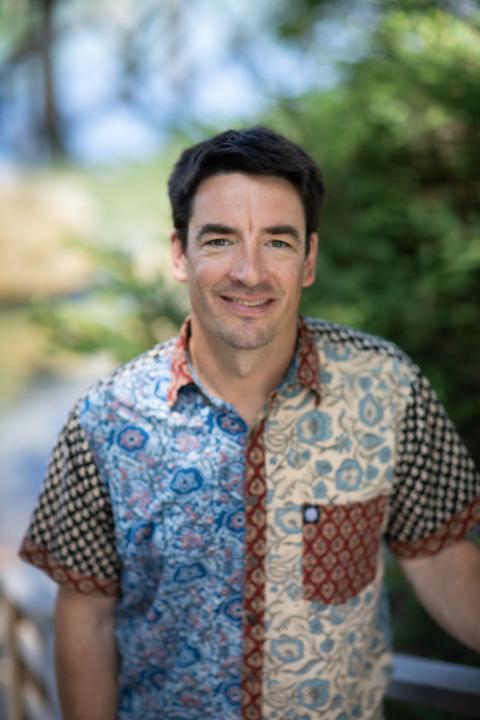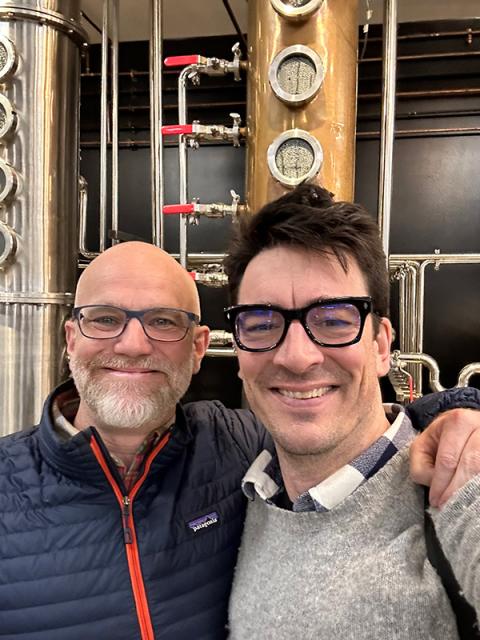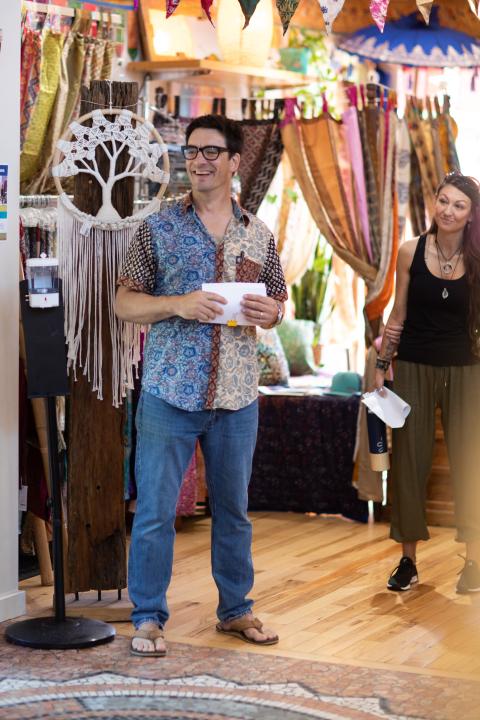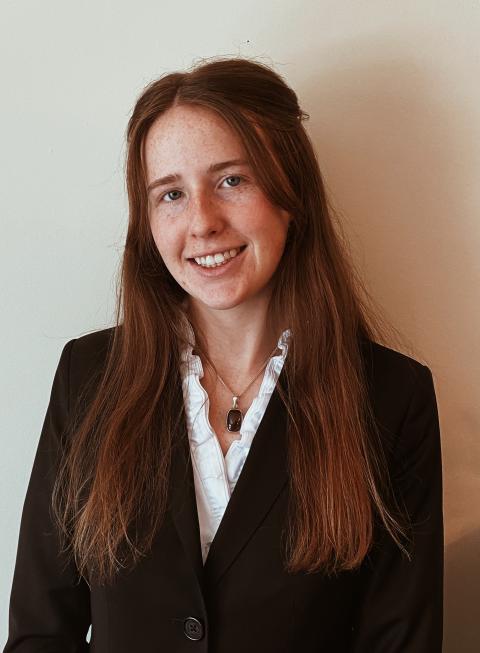UNH alum's sustainability path comes full circle

Mexicali Blues was a recent client in our B Impact Clinic, working with a team of students to complete the B Impact Assessment, the first step for a company to become B Corp certified. Mexicali Blues has been thriving for 35 years and Topher Mallory ’02 has had the privilege of leading as CEO for 19 of those years, now embarking on his 20th. The Erskine family still wholly owns the company and for Topher, are wonderful to work with and for. Nearly a decade ago, Topher also co-founded Split Rock Distilling with close friend Matt Page, and six years ago, they expanded their portfolio by acquiring and producing the Royal Rose Organic Syrup brand in-house alongside their certified organic spirits. "A significant aspect of my life and success is my incredible wife, whom I met during my senior year at UNH. This summer marks 20 years of marriage. We have two young girls that we are stoked to be raising here in Maine!"
We caught up with Topher to hear more about his sustainability experiences at UNH, then and now, which has laid the foundation for a life of impact.

What was your major(s)/minor(s), and favorite place on campus?
I graduated from UNH as a double major with degrees in Business Administration, focusing on Finance, and in Studio Art focusing on Drawing & Ceramics. My favorite place had to be the ginkgo tree outside of James Hall. It wasn't just the tree itself but the anticipation each fall of seeing its leaves drop almost overnight. It was a small, remarkable event that brought a sense of wonder and continuity during my college years.
What kind of work did you do as a sustainability-minded student interning with the Sustainability Institute?
During my internship at the Sustainability Institute (called the Office of Sustainability Programs), then in its infancy, I was involved in crafting marketing materials and nurturing relationships with a few departments working with Julie Newman. But it was the small, personal moments, like the trust placed in me to look after Julie's dog, that truly encapsulated the spirit of the place.
These experiences underscored for me the importance of first creating trust in relationships, and how those then become a springboard to fostering lasting change!

How did being engaged in sustainability during your time at UNH impact you, personally and professionally?
My time at UNH, particularly my involvement with sustainability initiatives, laid a foundational understanding that success isn't just about profit but also about making a positive impact. This was exemplified by my hands-on work with a composting project at the Sustainability Institute, an experience that highlighted the tangible benefits of sustainable practices. This understanding has guided my professional endeavors, from leading two certified organic businesses to steering Mexicali towards B Corp certification. At Split Rock Distilling, we dedicated ourselves to ensuring 100% of our waste stream was repurposed. We achieved an organic agricultural feed certification, allowing most of our spent grain and fruit to be used as feed on a local organic farm, with the remainder being transformed into organic compost. On a personal level, these experiences have deepened my appreciation for nature and the outdoors, influencing where I live and how I raise my children, and underscoring the importance of sustainable practices in every aspect of life.
Tell us a bit about your career journey – have you always worked for sustainability-minded organizations? And if not, why and how did you make that shift?
My career has been a winding road, with unexpected detours through hedge funds and surfboard manufacturing. This journey began at UNH, where I met my wife, Kristin. Our relationship, though perhaps not a conventional example of sustainability, has been a testament to the support and adaptability that are crucial in pursuing an unconventional career path.
This mutual support has been a cornerstone of our journey together, reflecting a key pillar of sustainability: the capacity to adapt and thrive through change.
The shift towards sustainability-focused work was a natural progression for me, driven by a desire for my career to mirror my values. It's been about finding purpose and meaning in my endeavors and striving to make a positive impact on the world around us.

Mexicali Blues just completed our B Impact Clinic where a student team helped you complete the B Impact Assessment, the first step to becoming B Corp certified. What motivated you to participate in the Clinic?
The decision to engage with the B Impact Clinic was influenced by discussions with industry peers like Phil Coupe from Revision Energy, who highlighted the value of the B Corp process.
Reconnecting with UNH and collaborating with students has been a rewarding full-circle moment, offering fresh perspectives and reinforcing our commitment to positive change.
Although I'm just beginning to directly work with the students, the anticipation of contributing to their learning and seeing their impact on Mexicali is incredibly exciting.
Why do you think third-party certifications like B Corp certification, or for us in higher education, AASHE STARS ratings, are important? What value do they bring?
Third-party certifications serve as a benchmark for companies and institutions to measure their commitment to sustainability, social responsibility, and ethical practices.
For Mexicali, pursuing B Corp certification is about more than recognition; it's a framework for ensuring our business practices reflect our core values of doing good in the world.
Similarly, for Split Rock Distilling and Royal Rose Syrups, being USDA certified organic is not just about the label. It represents our dedication to supporting the quality and sustainability of our farms and ingredients. This commitment to organic certification ensures that we not only provide high-quality products but also contribute positively to the agricultural community.
In both cases, it's about leaving a lasting, positive legacy that transcends the bottom line, ensuring that our impact on the world and our communities is a beneficial one.
We know the current generation of students cares about sustainability, but maybe don’t know how to get started taking action, or feel overwhelmed by global challenges that sometimes seem too big to tackle. What advice would you give to current students for their time at UNH, before they enter the working world?
During my time at UNH, I had shoulder-length hair for most of it, which my grandfather found less than amusing. When he questioned why, my response revolved around the desire to experience and feel life fully, embracing moments just like that one.
My career path hasn't followed a straight line, but one piece of advice I've consistently valued, shared with me by my wife, is the importance of supporting each other's journeys. To current students feeling daunted by the magnitude of global challenges, I'd say: focus on what genuinely motivates you. When you discover something that sparks your interest, pursue it with unwavering determination. No job is beneath you, and every experience holds value.

B Impact Clinic: Student Perspective
Sarah Jensen ‘25, Business Administration and EcoGastronomy
Student consultant for the Mexicali Blues team
I chose to do the B Impact Clinic because of my passion for sustainability, and found that the B Impact Assessment holds companies to ethical standards and propels businesses as a force for good movement. My group created policies, conducted research, and drafted surveys regarding employee and customer satisfaction. It was great to get professional experience working with a client. In my time at UNH, I have heard a lot about Corporate Social Responsibility, Creating Shared Value, and ESG (environmental, social, and governance). While it is great that so many companies are starting to improve their sustainability, a lot of it is not for the right reasons.
It can be difficult for consumers to know if a company actually has good intentions or if they are just greenwashing their products. When a company gets B Corp certified, there is no question about whether the company cares about its entire impact. The certification dives deep into every section of a business and pushes companies to be more conscious of the environment.
